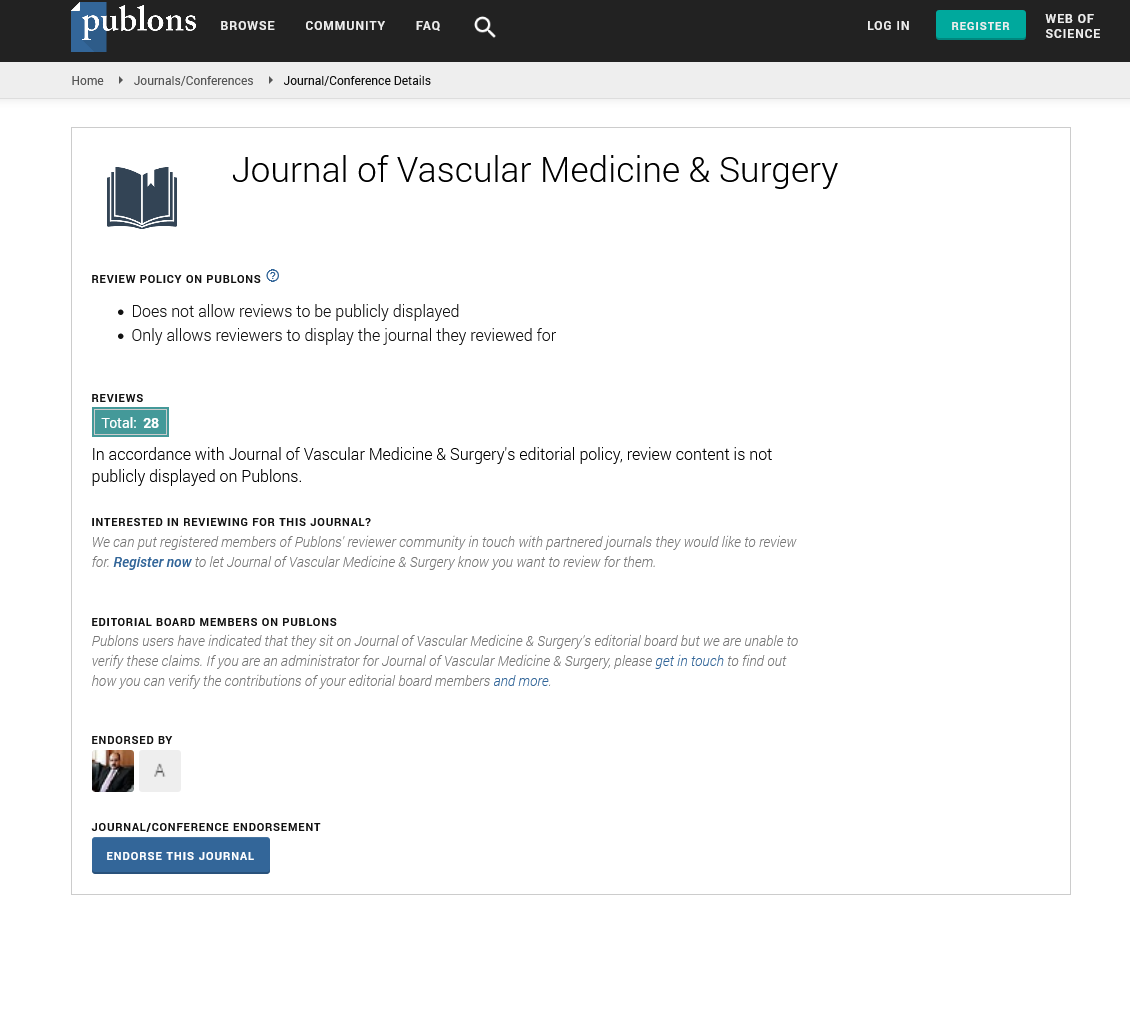Indexed In
- Open J Gate
- Academic Keys
- RefSeek
- Hamdard University
- EBSCO A-Z
- OCLC- WorldCat
- Publons
- Euro Pub
- Google Scholar
- SHERPA ROMEO
Useful Links
Share This Page
Journal Flyer

Open Access Journals
- Agri and Aquaculture
- Biochemistry
- Bioinformatics & Systems Biology
- Business & Management
- Chemistry
- Clinical Sciences
- Engineering
- Food & Nutrition
- General Science
- Genetics & Molecular Biology
- Immunology & Microbiology
- Medical Sciences
- Neuroscience & Psychology
- Nursing & Health Care
- Pharmaceutical Sciences
Perspective - (2023) Volume 0, Issue 0
Characteristics and Outcomes of Chronic Heart Failure
Ricardo Fonseca*Received: 02-Feb-2023, Manuscript No. JVMS-23-20212; Editor assigned: 06-Feb-2023, Pre QC No. JVMS-23-20212 (PQ); Reviewed: 20-Feb-2023, QC No. JVMS-23-20212; Revised: 27-Feb-2023, Manuscript No. JVMS-23-20212 (R); Published: 09-Mar-2023, DOI: 10.35248/2329-6925.23.S14.502
Description
Heart Failure (HF) occurs when the heart muscle is unable to effectively increase blood flow. When this occurs, blood frequently transmits and flow can accumulate in the lungs, causing difficulty breathing. Heart failure is characterized by the heart's ability and willingness to supply enough blood to the body. All major body functions are affected when there is reduced blood flow. Heart failure is a condition or established of symptoms that causes the heart to reduce or strengthen the muscles. In some people with heart failure, the heart continues to struggle to pump sufficient blood to support the body's other organ systems. Some people may experience heart muscle hardening and stiffening, which blocks or reduces blood flow to the heart.
Cardiovascular failure can occur on either the left or right side of the organ. It can be acute (short-term) or chronic (long-term). Heart Failure (HF) is also known as Congestive Heart Failure (CHF), it is a condition characterized by a malfunction in the heart's blood pumping function. Shortness of breath, chronic tiredness, and leg swelling are common symptoms. Breathing difficulties can occur during exercise. Chest pain, including angina, is rarely caused by heart failure, but it can occur if the heart failure was caused by a cardiac arrest.
The severity of symptoms during exercise is used to identify the degree of heart failure. Obesity, kidney failure, liver disease, anemia, and thyroid disease are all conditions that can cause symptoms similar to heart failure. Common causes of heart failure include coronary artery disease, cardiovascular disease, a high blood pressure level, cardiac arrhythmia, valvular heart disease, excessive alcohol consumption, inflammation, and cardiomyopathy. These lead to coronary artery disease by affecting either the structure or function of the heart.
Heart failure is classified into three types: Right-sided heart failure (affects the right heart), left -sided heart failure (affects the left heart), and biventricular heart failure (affects both sides of the heart). Left ventricular failure can be significant with either a reduced or preserved cardiac function. Heart failure is different from cardiac arrest, which occurs when blood flow prevents completely due to the heart's failure to adequately to pump.
Heart failure can occur suddenly as a result of a medical condition or injury to the cardiovascular system. However, in most cases, heart failure usually develops as a result of excessive chronic illnesses. Heart failure can be caused by the following conditions: Arrhythmia (a problem with the rate or rhythm of the echocardiogram), congestive heart failure coronary artery disease is caused by congenital heart defects or other types of heart disease, cardiac tamponade, myocardial infarction, heart valve difficulties, blood pressure that is too high, a clot of blood in the lung, obesity, Chronic Obstructive Pulmonary Disease (COPD) and other severe respiratory system illness.
Symptoms of heart failure
Heart failure symptoms differ based on which side of the heart is affected. The majority of the symptoms are caused by decreased blood flow to the organs and fluid build-up in the body. Fluid accumulation happens when the flow of blood through the heart is too slow. As a result, blood accumulates in the vessels that return blood to the heart. Fluid can sometimes transmit from the blood vessels and collect in the body's tissues, causing swelling (edoema) and other difficulties. Heart failure symptoms include: Fluid in the ankles, lower legs, or abdomen causes swelling and weight gain; sleeping difficulties when lying flat, the veins in the neck are swollen, breathing, and feeling unable to breathe when doing activities such as climbing stairs.
Complications of heart failure
The following are the complications of congestive cardiac failure: Heartbeat irregularity, sudden heart attack, heart valve difficulties, increase the levels of fluid in the lungs, hypertension of the pulmonary vessels, kidney disease, damage to the liver, and micronutrient deficiencies.
Citation: Fonseca R (2023) Characteristics and Outcomes of Chronic Heart Failure. J Vasc Surg. S14:502.
Copyright: © 2023 Fonseca R. This is an open access article distributed under the terms of the Creative Commons Attribution License, which permits unrestricted use, distribution, and reproduction in any medium, provided the original author and source are credited.

